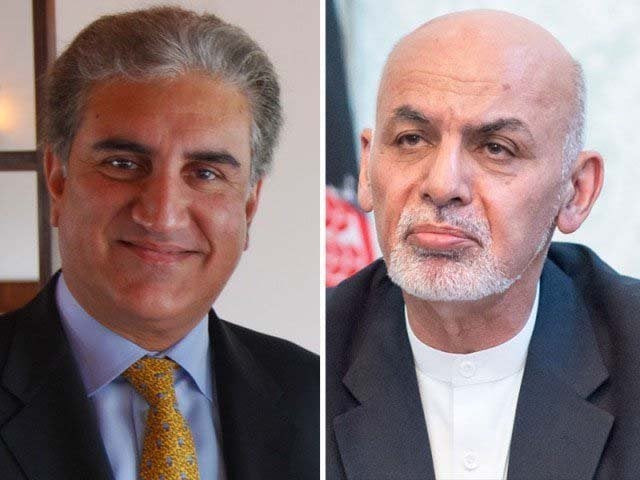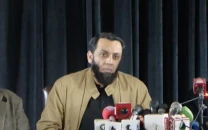Ghani’s tweet could undermine peace efforts, Pakistan quietly warns Kabul
Pakistan is facilitating direct negotiations between the United States and the Afghan Taliban

Foreign Minister Shah Mehmood Qureshi and Afghan President Ashraf Ghani. PHOTO: FILE
Ghani's unprecedented tweets commenting on the ongoing protest by Pashtun Tahafuz Movement (PTM) triggered a diplomatic row between the two neighbours at a time when Pakistan is facilitating direct negotiations between the United States and the Afghan Taliban.
The Afghan president also wrote in another tweet that he believes "it is the moral responsibility of every government to support civil activities that take a stand against the terrorism and extremism that plagues and threatens our region and collective security. Otherwise, there could be long-standing negative consequences."
Though he did not name anyone, it was obvious his statement was referring to the PTM's recent protest after one of its activists, Arman Loni died during a scuffle with the police in Loralai.
PTM leader thanks Afghan president for what Pakistan condemns as ‘gross interference’
Foreign Minister Shah Mehmood Qureshi was quick to issue a strong rejoinder to Ghani's controversial remarks.
"We reject the tweet by President Ashraf Ghani. Such irresponsible statements are only gross interference. The Afghan leadership needs to focus on long-standing serious grievances of the Afghan people," Qureshi said in a scathing tweet of his own.
National Assembly Speaker Asad Qaiser also took strong exception to the Afghan president's tweet, terming it "highly irresponsible, outrageous, gross interference in the internal affairs of Pakistan and against the norms of internationally-recognised principles of inter-state relations."
"Such indiscretions can affect the efforts that are currently underway to create bonhomie between the two countries," he said in a statement.
The NA speaker also added that instead of pointing an accusing finger towards Pakistan, it is better for President Ghani to focus on resolving the problems of his own people and finding solutions to the intractable issues confronting his country.
The speaker, referring to President Ghani's observations on religious extremism and terrorism said that it actually emanated from Afghanistan threatening peace and security in the region.
Ghani's statement was 'surprising and unwarranted,' commented a senior official here on Thursday.
The official revealed that soon after Ghani's controversial remarks, Pakistan had contacted the Afghan government to convey a 'clear message that such an approach by the Afghan government will not be accepted by any means.'
The two countries, the official pointed out, had covered considerable ground in restoring trust in their relationship. "But statements such as the one given by the Afghan president can potentially undo the good work."
Similarly, the Afghan government was told that any hiccup in the relationship will have a negative impact on the ongoing peace talks.
Pakistan, which has played a central role in brokering these talks, is seen as crucial for any peace deal in Afghanistan.
The official said Pakistan was still committed to the Afghan reconciliation process. "But the Afghan government must know that attempts to interfere in our internal matters won't help the cause," the official stressed.
Also attended by Pakistan, last month's parleys in Doha between US Special envoy Zalmay Khalilzad and the Afghan Taliban representatives made significant headway, something that was also acknowledged by both sides.
The next round of talks is scheduled to take place in Qatar later this month, where the two sides would work on the larger roadmap aimed at paving the way for a political solution to the 17-year long war.
Earlier this week, the Taliban also met prominent leaders from Afghan opposition groups including the Northern Alliance in Moscow. The Afghan government, however, was conspicuous by its absence as the Taliban have refused to talk to the Ghani administration directly.
"The statement of Ghani on Pakistan could be linked to his frustration at being sidelined from the ongoing peace process," said another official, who added that Pakistan and other stakeholders were pushing the insurgent group to meet the Afghan government's representatives.



















COMMENTS
Comments are moderated and generally will be posted if they are on-topic and not abusive.
For more information, please see our Comments FAQ